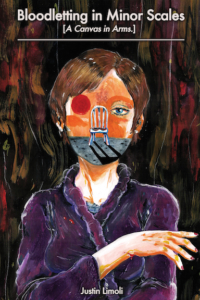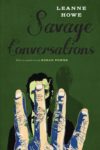Justin, the playwright’s first name as a character in his own play, and Blood, declaring itself “the bleeding finite,” discuss the beginnings.
Blood: Yes, and all beginnings need victims.
Justin: I didn’t want this.
Some works of art are their own beginnings (and ends); and these works start something in and of themselves, in the sense of being a start in the world. Such acts of initiation are neither simple, nor straightforward, nor victimless (starting with the artist him or herself first and foremost), nor a matter of intent, nor control. The force of the work creates its own form. The force of the work — its need, its passion or anguish, its vitality or rage against death, against oblivion — makes it its own thing, its own genre, sui generis. But to use words such as “unique,” “innovative,” and “original” risks the hyperbole attending any sui generis claims, since there are no vacuums in the world of art or forms. The world works into all works. It is the ingrate’s arrogance to neglect the influence of culture and precursors (though more than any other, the sui generis work creates its own precursors, as Jorge Luis Borges would say: the brilliance of a surprising configuration illuminates forerunners from a new angle, casting back their shadows). Still, in complete acknowledgement of genres and handed-down forms, sometimes an urgency presses through it all, and becomes transformative. Conscious or not, in the imperative of the creative force, the artist of a sui generis work produces on her or his own terms, and by internal necessity comes to terms with what the work presses through.
The book of Justin Limoli’s play, Bloodletting in Minor Scales [A Canvas in Arms.], is such a work — there’s nothing like it and yet it’s recognizable immediately as a poet’s lyric keening. Sensitive, discerning, and heart-scarred, the book’s author refuses to let go his desperate loving hold on a harrowing event: his mother’s attempted suicide. The narrative is shattering. Its contents cleave through Denial. An anguished why? busts apart the multiplicity of forms constituting the work: prose, drama, and poetry (and the poetry itself enters the drama in a variety of poetic forms) — and though the question is rhetorical, the anguish is an earnest power. This power bleeds teardrops from wounds, opens roses of Limoli’s poetic prose such as in the following impossible stage direction:
[Mom impales her left wrist with a swooning cleaver, a chandelier of Blood enters through her, and Justin is left. He plants his unsoiled tongue into his chest, so that it may pollinate with his heart. Mom is dragged offstage and thrown into the inner ribs of Mental Ward to recuperate.]
On one level, this sui generis work is actually of genre, implicated and categorizable as Poets Theater, or Verse Play, with traditions ancient and modern (U.S. poets’ approach to theater along identifiable lines and practices has a seventy year history at this point, cf. The Kenning Anthology of Poets Theater 1945-1985). More, Bloodletting could be considered a perfect example of a Poets Theater recent subgenre, Poetics Theater. As structurally divergent from mainstream American drama as you can get, Poetics Theater provides an artistically flexible, informed, and free-form experimental “space” (whether for the stage or in thought) conducive to the achievement of heightened poetic presence through performance, one of the few ancient elements of live theater left to its sole purview. Nevertheless, Limoli’s play bleeds out from the context of this genre, only to reanimate beyond all genre, as a work of art, irreducible. Plus, as hybrid as Poets Theater and Poetics Theater already are, the book enters into further cross-disciplinary engagements — indicated by the diction of music in the title and, suggested in the subtitle, painting, along with (by “in Arms”) a hint of military art, of struggle and battle — to emerge a luxuriant, hauntingly beautiful, strange and brutal chimera, real as torment.
Justin: [In a syncopated off-meter.]
My name is Justin
and my mother
slit her wrist
with a cleaver
Plays Inverse is just the publisher for Limoli’s Bloodletting in Minor Scales, a small press based in Pittsburgh (and now New York), with its focus on Poetics Theater-inflected Poets Theater. Publisher Tyler Crumrine dedicates his press to honoring the book of the play as much more than a mere script and handbook for staging: the text stands, the work exists, with or without production, and the play as written and read is as much to the purpose as the play performed. At this point, I can’t imagine the art of the play detached from the art of the book, can’t imagine it without the cover image (by Dave Watt) as a colossal backdrop canvas: curtains of brushstrokes in brown and black, the face of a woman with a side-parted bob (but only her ears and one tourmaline blue eye, sorrowful and wounded, are actual human features, for this is a stitched together face, with a mask covering mouth and chin, a chair in the place of her nose, and a patch of a perfect circle of blood-red paint like a wax seal in place of the other eye, thickness of a coat button), a knobby purple robe with lustrous globs of blood on the indent in front of her shoulder, and her arm crossed in front of her — again, the “in Arms” of the subtitle throwing multiple meanings, the text there in parallel above the prominent baring of her arm, the mother’s arm, with robe sleeve falling back — wrist gashed and dripping, but its bend as of the most lovely of gestures, a dancer’s poise of fingers and hands, held in tree limb stillness, the slight twist of a delicate branch.
The beginning of Bloodletting repeats, because trauma is an endless loop in real life; in the phantasmagoria of the play, attempted suicide is the carousel of a carnival nightmare. The organ breaks down and mechanics go haywire and yet scenes and songs and poems revolve in garish display. Headings function dually as scene titles in the acts of the play and as poem titles as if for a collection of poems: “Mother, as a swelling word”; “Maternal Red blossoms Petaled”; “Mother, as a spilling”; “Suicide repeats Ulysses”; and the heartbreakingly wry, “I can’t give this a name.” Limoli’s lush prose has me thinking of bleeding flowers and wounds, eyes looking back from scars, and indeed there’s a bit of that actually there in the text (“blossoms where your wrists were”), but I realize I’m tending too much the mirage of a hanging garden amidst a violent, turbulent domain; I’m lingering with the knowledge — and it’s good to know — that this young poet from Hawaii, whose mother hacked her wrist with a meat cleaver, works a day job with bonsais and orchids as a horticulturist in Maui. He cultivates bloom and perfumed breath, a humid atmosphere of soothing. Good job for a poet who coaxes beauty out of horrors.
Prominent speaking parts are given to the characters of Justin and Mother and also the grandmother, Mombo, but the issue of dialogue is problematic enough (when the topics of communication are so fraught) that Dialogue itself becomes a character, as does Mental Ward — both character and setting — and so there are scenes/poems titled “Dialogue’s Monologue” and “Mental Ward’s Monologue,” and even Audience is given lines, along with Closure: “May I enter?” A non-comprehensive character list acts as Character List and names Poetry and Orchestra Pit and Stage Fright as characters interactive with Mom, Dad, and Justin. Throughout the play all sorts of figures, abstractions, shocks and imaginings take the stage, and speak, from the aforementioned Blood, to Cupboard and Heart, and Devil, and Dante, and Aeneas, and Camus, as well as Suicide of course, and Buckminsterfullerene, “(lovingly called Buckyball).” This latter enters with an illustrative complexity, multivalence of interpretation and activation, in the exact same manner as Schrödinger’s Cat and Chthonic White Space later appear: a recurrent stage direction of “[Mental Ward opens to reveal]” has Mental Ward as character and/or set offering Buckyball as a character or stage prop or set piece. Here, affliction makes everything speak, and yet the inadequacy of what can be said has its own silent inhabitance.
The Unspoken Poem bows and exits.
The multivalence of Mental Ward, as character and setting, and as actor-propellant for the drama and stage business, is illustrative of how Poets Theater works — as what can only first and primarily be imagined through the reading. The best playwrights are poets in this manner: Beckett and Shakespeare are best read; Shaw, more prosaically, is best read. Poets Theater, in particular, consciously employs the imagination of the reading to activate the poetic, and to realize the work’s imagery. The real imagined world is the original venue, and productions are merely approximations. Limoli’s Mental Ward is especially suggestive as a construct for the Theater of Imagination that is Poets Theater, but without bolted doors and bars on the windows, freeing the word mental: a mental space performs itself in real time. It’s more than staging the play limitlessly in one’s own head during the reading (although this in itself secures the work beyond the limits of mechanics, economics, and performance talent) — imagination has the capacity to release the image in its reality, unrestricted by distinctions between external and internal. In fact, while Mental Ward — or “Mental Ward” or Mental Ward — functions as an imagined setting and source of speech and action during the reading of Bloodletting, for any live staging however produced there would have to be likewise a layer of imagination implicitly engaged to make it function thus as an onstage presence.
Poetics Theater, taking off from the freedom from production exigencies long enjoyed by Poets Theater diy traditions in the U.S., and extending material playfulness from theatrical imagination to word and syntax, goes even further into structural invention and overturning of theatrical expectations. Further still, Poetics Theater is an operational theater for overturning linguistic expectations. In Limoli’s practice, this allows for a recasting of the word so that Suicide can say, “My name is Suicide repeatedly” and makes sense of stage directions such as “[Verbed tense.]” Here, sophisticated confrontation with the medium of language offsets the blunt subjectivity and emotion of Limoli’s personal tragedy. As much as vulnerability is brave, the avant-garde castigates autobiographical sentiment (and the avant-garde is the garden of Poetics Theater’s growth). This can be noted in the habitual decrial of the lyric, though I am noticing more defenses of same as of late, with all due defensiveness. Be that as it may, sui generis mastery embraces as many aspects of a medium as possible, and Limoli stays both transparent to the self-expression of his tragic event and dexterous with the textures of language’s materiality, objectivity, sensuous concretion. “Ashes between the two strokes/of cognizance.”
On the flip side, its avant-garde tenability notwithstanding (despite “tortured soul” theme and subject matter), the play’s play of aesthetics doesn’t in the least anesthetize or formalize away the truth — or the truth of suffering, or the bitterness of entreaty — as so often happens when invention is merely academic. Irresistible as Sylvia Plath’s “Daddy” — Limoli’s grown man’s cry of “Mommy,”wrung out of him.
Anguish. Agony. Intensity. The dismissal of “heaviness” from experimental or mainstream quarters alike is an evasion. One can have a demand on the audience or reader. In fact, that comes with the territory of artistic commitment: “attention must be paid,” to quote a twentieth century theater classic. I don’t much see how a political demand can be made of the case of an attempted suicide by a young man’s mother (society is sick and sickening, Western civilization discredits itself consistently, her sickness and suffering could be connected to this state of affairs and probably there’s blame to be placed therein, and yet any campaign for some cause pulled out of her despair would be missing the point and missing her, and those like her); but the artistic demand on attention ought to push its claim. The artistic demand is warranted, and takes precedence over complaints against heaviness, puts to shame disdainful frigidity that designates as “confessional” the human, and tragic.
Cloaked Epiphany: Philosophical thinking begins with the human subject – not merely the thinking subject, but the acting, feeling, living human character.
Poetry at source is an intimate thinking, the philosophical personal. Art must open — or keep open, or hold threatened ground of — human spaces, including those of suffering. Justin Limoli’s Bloodletting in Minor Scales [A Canvas in Arms.] is raging, is in pain. Is a work of wracking love for a suicidal mother. Its intensity is its access.
Magus Magnus‘ work sources poetry and “the poetic” as central both to the extremes of interiority (thought, philosophy) and exteriority (performance, deed). His books include The Re-echoes, Idylls for a Bare Stage, Heraclitean Pride, and Verb Sap.
This piece originally appeared in the Full Stop Quarterly Issue #2. The Quarterly is available to download or subscribe here.
This post may contain affiliate links.








